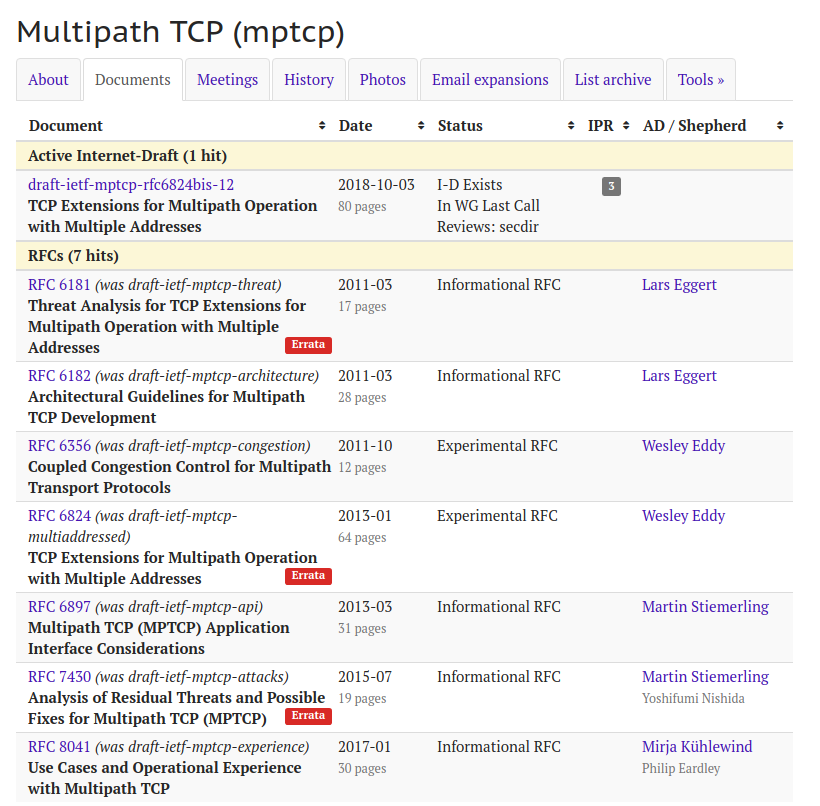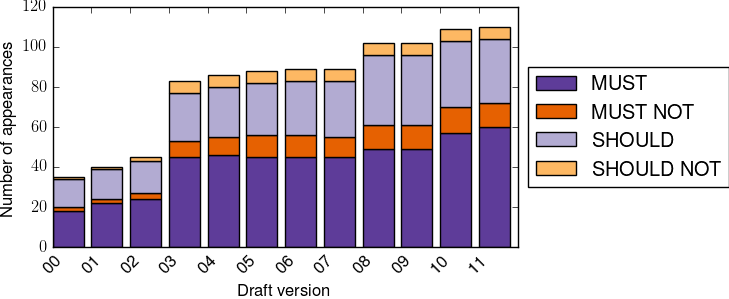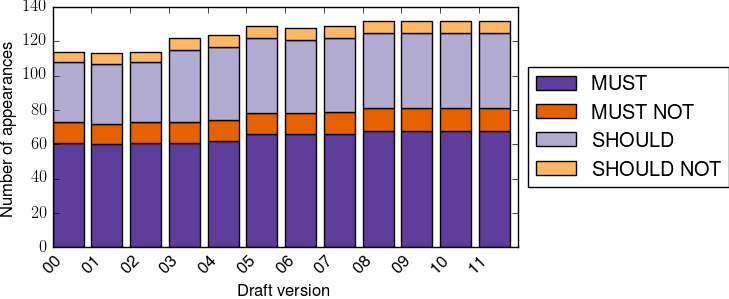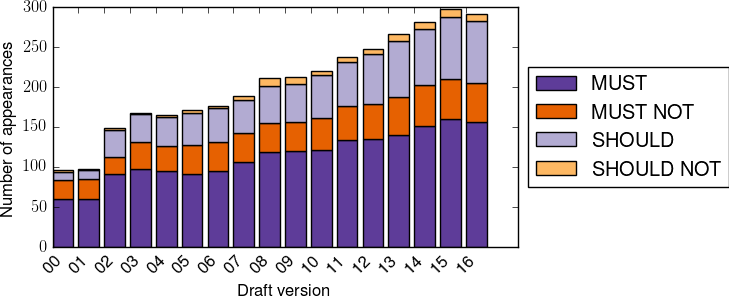Evolution of the documents produced by the MPTCP working group
Since its creation, the mptcp working group of the IETF has produced 7 documents that were published as RFCs and an eighth one is currently in last call. This post provides a brief description of these different documents as a starting point for someone who wants to start to look at multipath transport protocols.

The working group has produced two Experimental RFCs and five Informational ones. The first two RFCs are RFC 6181 which discusses the security issues that were taken into account for the design of Multipath TCP and RFC 6182 which describes the basic architectural principles for Multipath TCP. RFC 6182 has already been discussed in a previous blog post. RFC 6181 was written by Marcelo Bagnulo and builds upon earlier work on a security analysis of Mobile IPv6 in RFC 4225 and shim6 RFC 4218. The key security issues that are discussed in this document are :
- a flooding attack where an attacker who forces a server to send packets to a victim address by trying to force the server to use a subflow towards the victim. This attack was a concern for network layer protocols, but for Multipath TCP, this is not an issue since Multipath TCP validates the creation of the subflows with a three-way handshake and the MP_JOIN option.
- a hijacking attack where an attacker leverages the address agility mechanisms of Multipath TCP to hijack an existing connection. One concern was the risk of an attacker being able to create a man-in-the-middle attack against existing Multipath TCP. This attack is prevented by the mechanism used by Multipath TCP to create subflows.
- a discussion of time-shifted hijacking attacks
The threats analysis continued ad was later expanded in RFC 7430. This RFC introduces other types of attacks : an attack on ADD_ADDR which could allow an off-path attacker to create man-in-the-middle attack but under very unlikely circumstances, a denial of service attack on MP_JOIN, a SYN flood amplification attack and an eavesdropper that observes the initial handshake. These attacks were considered in the design of Multipath TCP or their implementations.
The other Informational RFCs are RFC 6897 which discusses API considerations and RFC 8041 which describes the known use cases where Multipath TCP has been deployed. Some of these use cases are also discussed in [BS16].
The three main documents produced by the mptcp working group are RFC 6356 which defines the coupled congestion control scheme and RFC 6824. As their publication date suggests, the congestion control scheme was stable much earlier and the protocol specification.
Experimental and Standards-track RFCs contain MUST, SHOULD and other keywords defined in RFC 2119. As RFC 6356 specifies a congestion control scheme, it only include two MUST keywords. However, RFC 6824 provides a precise protocol specification that leverages these keywords.

The above figure, plotted with a script developed by Maxime Piraux for [PDCB18], shows the evolution of the utilization of the RFC 2119 keywords in the different versions of draft-ietf-mptcp-multiaddressed. There were three main phases in the utilization of these keywords: a low usage in the first four drafts, then a sudden increase in draft-ietf-mptcp-multiaddressed-03 that included changes in the MP_CAPABLE option, the addition of an address identifier in MP_PRIO and answers to review comments a huge list of changes.
It is interesting to observe the evolution of draft-ietf-mptcp-rfc6824bis

The above figure shows that when looking at the RFC 2119 keywords, the specification did not change a lot compared to RFC 6824. Most of the changes were clarifications except for the redefinition of the MP_CAPABLE option as discussed in a previous blog post.
In contrast, the transport part of QUIC, defined in draft-ietf-quic-transport appears to be much more complex when counting the RFC 2119 keywords and the specification is not yet finished.

References
| [BS16] | Olivier Bonaventure and SungHoon Seo. Multipath tcp deployments. IETF Journal, 12(2):24–27, 2016. URL: https://www.ietfjournal.org/multipath-tcp-deployments/. |
| [PDCB18] | Maxime Piraux, Quentin De Coninck, and Olivier Bonaventure. Observing the evolution of quic implementations. In Proceedings of the Workshop on the Evolution, Performance, and Interoperability of QUIC, EPIQ’18, 8–14. New York, NY, USA, 2018. ACM. URL: https://quic-tracker.info.ucl.ac.be/blog/results/paper/2018/11/19/epiq-18-paper-accepted.html, doi:10.1145/3284850.3284852. |